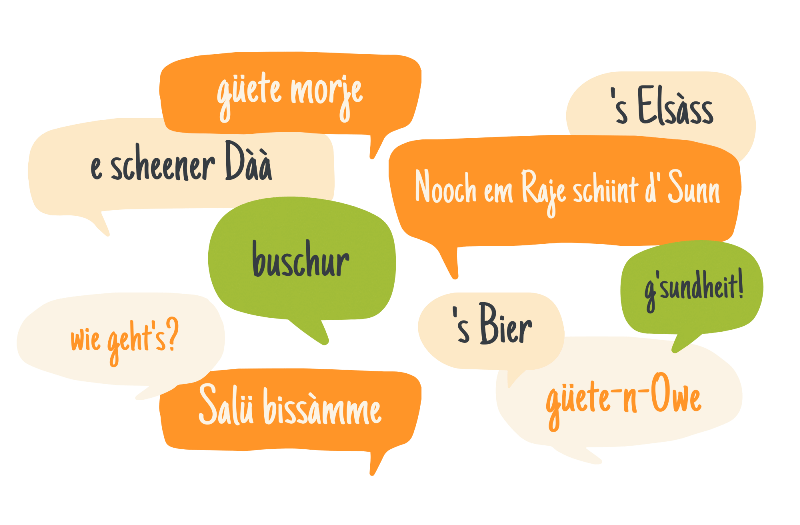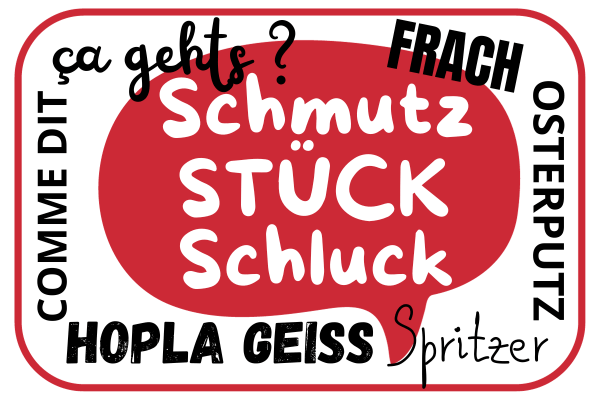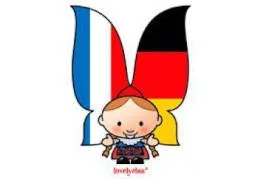Alsatian Humour: Alsatian Dialect Expressions...
Alsatian, an often untranslatable dialect...
Alsace, a region located in eastern France, has a rich linguistic tradition that goes back several centuries. The Alsatian dialect is a regional language that has been influenced by French, German and Latin.
Although less and less used in everyday life, the Alsatian dialect retains a unique charm and colourful expressions that are often used in conversation.
The Alsatian dialect is a Germanic language. It has a multitude of variants from the south (Haut-Rhin) to the north (Bas-Rhin) of Alsace. But it is also, at least since the Revolution, the language of the enemy, subject to particular historical conditions.
In Alsace, the recent changes in national affiliation and, consequently, in the official language, have led to changes in the status of the dialect and its strong involvement in political struggles.
The dialect, still widely practised, represents the major element of Alsatian culture and identity, which is manifested in many forms.
It is both a culture lived in everyday life through the use of the language, and its scholarly expression through various literary manifestations.
Finally, the dialect is also, and more than ever, the main support for the demands for political autonomy and the guarantee of their sincerity.
As you have probably already noticed when talking to a French person from another region, there are words or expressions that are specific to Alsatians, which strangely enough others do not understand !
Often these are expressions translated from the dialect that remain in our everyday French.

Here are some examples:
- Alsace Elsass
- Hello Buschur
- Hi Sàlü
- Hi everybody Sàlü binander
- Hi everyone Sàlü bisàmme
- Hi, how are you ? Sàlü, geht's?
- I speak Alsatian Ìch redd Elsassisch
- Here we speak Alsatian Do wurd elsassisch geredt
- More Alsatian than me, you die Meh Elsasser un elsassisch às ìch, da stìrbsch
- I do not know anyone Ìch kenn nième
- It annoys me D'Narve gehn mir dure
- Not a word, silence Kè Wort meh
- Whether he wants it or not Äb ar wìll oder nìt
- That is true Dàs ìsch wohr
- Completely hammer Do wirsch jo kàppalatz
- Go hop Hopla Geis
- For the good of all Zum Wohl fer alli
- Come on Hop komm
- Come on, it's good Hop la, ìsch güet
- Time Zitt
- Outside Nüss
- Nothing Nix
- Get yourself together Nìmm di zamma
- I am tired Ich bìn moila
- Come Kumm
- How are you ? Wie geht's ?
- Slowly we're getting this far Làngsàm kummt m'r aui wìt
- We take what we get M'r hàt gnumma wàs m'r bekumma hàt
- After rain the good weather Noh'm Räge, schiint d'Sunne
- I remain silent like a fish in water Ìch blib stumm wie a Fisch im wasser
- That’s also not bad either Das ìsch aui nìt ìwel
- Excellent Prima
- Thank you so much Merci vielmols
- Do not make me laugh Màch mi jetz nìt làche
- Good continuation Màch's güet
- A good day A güeter Tàg
- Midday Mìthìì
- Last night andlt; Nachta
- Weekend Wuchaand
- During the weekend Ìwer der Sunntig
- Have a nice week end Scheena Wuchaand
- Like at home Wie d'heim
- Together Bisàmme
- Yes that one was good La der ìsch güet gsìì
- Then !... Ja do
- Now it starts Jetz geht's los
- Yes of course Jo amel
- Do you think Jo wuhar denn
- Remember andlt; Dank drà
- Who is here ? Wer ìsch do ?
- Goodbye ! Uff a Wìdersah
- Many times Vielmols
- I would be very grateful if you could help me Ìch wardigt ni sehr dànkbàr wenn Sìe mìr halfa kännta
- You know Weisch
- From store to store Vu Gschaft zu Gschaft
- It's terribly expensive ! Villmassig sauitiir !
- Is not it Gall
- You click and it's ordered Düesch klicka un 's ìsch bstellt
- There I can wait until the end of the month Do kànn ich wàrte bis Ultimo
- Do you think Vu waga
- When the supply is there, you mustn't miss the demand Wenn's Bàbba ragent hàch kè Läffel
- Less is better Weniger isch besser
- I'm the best Ìch bìn dr bescht
- When the cat's away the mice will play Wenn d'Kàtz nìt do esch, sin d'Miis Meischter
- I'm proud of you Ìch bì stolz
- Go to the House Heim
- Go take a nap, snooze andlt; Gàng ge pfüsa
- Sleep well Schlof güet
- The same Gliichfàlls
- Well then Güet
- It's good Es ìsch guet
- You make a noise Dü màchsch a Gràmboll
- In your head you're still young Ìm Kopf, bìsch noch jung
- Something is happening Es ìsch ebbes los
- He pretends nothing is happening Ar màcht, wia wenn nix war
- This is a good ! 'S ìsch a güete !
- That's right 'S ìsch güet des
- Does not ring a bell 'S ìsch m'r nìt drum
- I do not care 'S ìsch mìr wurscht egàl
- It's not normal 'S ìsch nìt normàl
- It does not matter 'S ìsch nìt schlìmm
- There all is lost Do ich Hopfa un Màlz verlora
- That's a good thing done Das wär überstande
- Goodbye Àdié
- A big kiss A großer Schmutz
- A real pigsty A rìchtiger Sauistàll
- The farmer D Büürsfràui
- No pig gets so old So àlt wìrd kein Söi
- If you're not good I'll put my head between your ears Wenn dü nìt bràv bìsch, setz i dìr dr Kopf zwìscha d Ohra
- The one who drinks the allowance money Kìndergaldsüffer
- Crafty, Mischievous Gschléfener
- What's the street? Was esch de Stroos?
- Where do you live? Wo wohnsch du ?
- What's the weather like tomorrow? Was hännmer morga fir d'Weter?
- I'm driving I fahr im Auto
- I'm on my bike II fahre mit'm Velo
- I'm coming on foot Ich komme z'Fuß
- I'm going shopping Isch geh eikaffe
- I love Alsace Ich mag d'Elsass
- Where are you from? Un du, wo kommst du her?
|
- To be drunk A Pflüme hàà
- So make a horse laugh (let me laugh) Màch doch a Ross làche
- Dear Mom Liewi Màmma
- Mom Màmma
- Girl Bibbala
- Little girl Maidala
- She is really a beautiful girl andlt; Dàs ìsch doch a nats Maidele
- Little sweetheart Schàtzala
- Fellow Mennele
- Dance for children Pipalatànz
- Lots of children Vìel Kìnder
- I Love you Ìch hab dich lieb
- I love you very much Ìch hà dìch sehr liab
- I kiss you Ìch màch èich a schmutz
- I say thank you Merci !
- A beautiful Christmas and a good passage in the new year A scheni Wihnàchte un a güeti Rutsch ins Nejes Johr
- Beautiful Christmas, Merry Christmas Scheni Wihnàchte
- A merry Christmas E gìckliga Wihnàchta
- Birthday Geburtsdäj
- I wish you a happy birthday Ìch wìnsch èich a scheen Geburtstàg
- Happy Birthday Vìel Glìck zum Geburtstàg
- I wish you very beautiful Christmas holidays Ìch wìnsch èiech a scheena Wiahnachta
- Good passage (in the new year) Güata Rutsch
- Happy New Year Güet nèi Johr
- Best wishes for this New Year Àlles gute in des nèie Johr
- A good passage (in the New Year) A güata Rutsch
- It's time 'S ìsch Zitt
- One year old today Ìsch hìt ein Johr
- Biscuit Bredele
- Pastry chef Zuckerbäck
- When the peasant doesn't know, he doesn't eat Wenn dr Bür nìt kennt, frìsst'r nìt
- Alsatian recipe Elsassischa Rezapt
- Liver pate Lawerwurscht
- Black sausage Schwàrzwurscht
- Meat sausage Fleischwurscht
- Salted turnip Sürariawa
- Sauerkraut Sürkrüt
- White cheese Bibbelekaas
- Tarte flambée Flàmmeküeche
- Tarte flambée and Edelzwicker, it's better ! Flàmmeküeche un Edelzwicker ìsch besser
- Pinot Gris Der Klawner
- Hot wine Glühwein
- Don't drink so much ! Süffe nìt so vìel !
- Red currants S Hànstriiwala
- Pan-roasted potatoes Ràuigebragelta
- Chewing-gum Zull-Gummi
- Enjoy your meal A Güeter
- God be praised ! Gott sei dànk
- Remove his fingers D Fìnger awagmàcha
- The apple does not fall far from the trunk D'r Äpfel ghèit nìt witt vum Stàmm
- Those who receive usually have a lot D'r Hund schisst nìt uf a kleiner Hüffe
- The stork in the salad D'r Stork ìm Sàlàt
- Bathroom towel D'Zwahla
- Alley Cat Dàchkàndelhüpser
- This is our Napoleon 1st Dàs ìsch unser Napi
- The shelf Der Schàft
- Put sticks in the wheels Spielverderwer
- There you see it, black on white Do gsehn ihr's, schwàrz uf wiss
- Something's going on in the alley Do ìsch ebs los ìm Gassel
- The old horse Dr àlta Bigger
- Freedom Frèiheit
- God Gott
- Rubber slippers Gummischlàppa
- Aluminum foil Stàniol
- Comb Strala
- Pavement Treppeler
- Forum (IT) Ratschplàtz
- The doctor's thing S' Dokterdìngs
- Half the meadow is mown S hàlwa Mattla ìsch gmeiht
- Cat wig Kàtzabàrrìckes
- No roses without thorns Kè Rosa ohna Dorna
- Church in the village Kìrch ìm Dorf
- When you are part of the choir you sing with Wenn dü im Gsàngverein bich müesch mìt sìnga
- If only I had never been born War ìch numma nia gebora worra
- Say bad things about someone Dùrich dr cacao zieh
- Swear ... god damn me Gott verdàmmi
- Scoundrel Dü Lump
- He is crazy Da hàt a Kàppa voll
- Manure Head Mìschthüffakopf
- Poor devil Àrme Tèifel
- A rascal A Kneckes
- Rascal Scharaschliffer
- Slug Schlàwiner
- Ass lick Dogalamüser
- Strong nerves Narfe wie a Sauschwanz
- Name of a dog Nunda Buckel
- A bitch S Hundawiwla
- Sweaty feet Schweissfiesler
- Legless person Schweissfiesler
- Pissing in bed Bettseicher ou Bettbruntzer
- Bare skull Bluttschedel
- I'm working today Ich arbeite hitt
- The cherries are ripe Die Kersche sin resch
- How much does it cost? Merci vielmols
- Thank you and see you tomorrow Merci un bis màrig!
- It's up to you S'esch wia du witt viel
- I like Tarte Flambée Ich lüewe Flammküeche
- Tonight, restaurant ! Heit Owend, Wirschaft!
- The dishes are done Die geschirr ist fertig
- The shop is open S'Schiifl isch offe
|

Here are some other common Alsatian expressions:
- "E Hàmmer" - literally, "a hammer". This expression is used to describe someone who is clumsy or lacks finesse.
- "E gueter Rutsch" - literally, "a good slip". This expression is used to wish someone a good year or good luck.
- "Wàs hàn d'r Kàtz dém ùff em dàche g'sààt?" - literally, "what did the cat say on the roof?". This expression is used to express ignorance or misunderstanding.
- "Schlàft de Kàtz ùff em Rüschtig, schlàft's ganzi Hüschtig" - literally, "if the cat sleeps on the pillow, it sleeps all night". This expression is used to express the idea that habits tend to be perpetuated.
- "Ùn de Kàtz' hàn àll Hoor üssser de Làtz" - literally, "and the cat has all the hair but the tail". This expression is used to describe someone who is late or missing something.
- "E réchter Elsàsser schlàft net, er ruht sich" - literally, "a true Alsatian does not sleep, he rests". This expression is used to describe the hard work of Alsatians and their habit of taking naps rather than sleeping at night.
- "E Màhlesse" - literally, "a meal". This expression is used to describe a big meal or a party.
- "Ùn de kàtz hàn d'r Réjewäjer àus em Hals" - literally, "and the cat has sauerkraut in its throat". This expression is used to describe someone who has eaten too much sauerkraut.
- "S'esch net alles Wàrschd" - literally, "it's not all sausage". This expression is used to say that one should not take everything at face value, that one should look beyond the obvious.
- "Gànk àlsàssisch esch àls lùtere Himmelblà" - literally, "speaking Alsatian is like a clear blue sky". This expression is used to describe the beauty and purity of the Alsatian language.
- Hopla!" - Come on! Used to encourage or punctuate an action
- Schmoutz - Kiss
- Schlouk - A little sip, often of alcohol
- Oyé! - Expresses surprise or exclamation, a bit like "oh là là!"
- Avoir du späck - To be fat, a little overweight
- Espèce de quetsche! - Little affectionate insult, "quetsche" being a local plum
- Make a schmoutz - Make a kiss
- Monter sa tirette - Pull up one's zipper
- Kopfertami! - Swearword equivalent to "holy shit!"
- Holding someone's thumbs - Crossing your fingers for someone, wishing them good luck
- A guata! or A Güeter! - Bon appétit
- Buschur - Bonjour
- Sàlü binander / Sàlü bisàmme - Salut tout le monde (Haut-Rhin / Bas-Rhin)
- Schlopps - Slippers
- Do wirsch jo kàppalatz - You're completely hammered
- D’Narve gehn mir dure - It gets on my nerves
- Uff a Wìdersah - Goodbye
What is the difference between a language and a dialect ?
A language is a system of vocal signs specific to members of the same community, so from a strict linguistic point of view, there is no difference between a language and a dialect.
The difference between a language and a dialect is not strictly linguistic, as a dialect has all the characteristics of a language (grammar, syntax, etc.). The main distinguishing criteria are
- Official status: A language is generally recognised by a state or an institution, which gives it prestige and stability, particularly in written form. A dialect, on the other hand, does not have this official status and is often confined to oral or regional use.
- Standard and standardisation: Language is the subject of standardisation (rules, dictionaries, institutions), whereas dialect evolves more spontaneously and does not always have a standardised form.
- Socio-political dimension: The designation of ‘language’ or ‘dialect’ often depends on political, cultural or historical considerations. It is sometimes said that ‘a language is a successful dialect’ or that ‘a language is a dialect with an army and a navy’.
- Linguistic continuum: There is no clear linguistic boundary between language and dialect; rather, there is a continuum, where differences are gradual and intercomprehension is possible between neighbouring dialects.
However, a language is a means of communication defined and imposed by a State, whereas a dialect is a spoken language that has not been codified and is the result of a community's desire to perpetuate an ancestral tradition.
In conclusion, Alsatian expressions are an important part of Alsatian culture and reflect the history and traditions of this unique region.
Would you like to make a modification or bring us your Alsatian knowledge ? Contact us
© Copyright - Any reproduction or use, in whole or in part, of the contents and photos of this site is prohibited.





Latest comments